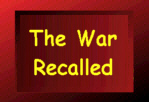
|
|||||||||||||||||||||||||||||||||||||||||||
|
An understanding of the Great War cannot be reached with even the most thorough review of its facts and details. All those bits of information must be fit together into a unified "complete picture" so a person can comprehend the stupendous and complicated events of 1914-1918. This process of grasping and apprehending a subject is also a personal process. This second point is critical because it means we insert our own desires, wishes and fears into our search for understanding.  Some Symbols of the Great WarThis brings us to the purpose of this Great War Society website on The Legends and Traditions of the Great War. This is not intended to be a collection of charming stories and myths, at least as in the "myth" of the flat earth. These articles are all serious efforts at demonstrating how individuals and groups beginning during the war itself and carrying on ever since, have tried to gain an understanding of what was happening on the battlefields of Europe, the peripheral theatres and the homefront. Our Soldiers' Tales and Words and Phrases of War selections show how -- on a daily basis -- the troops in the trenches dealt with the frightening whirlwind that had embraced them. The Pantheon of Heroes, Villains and Gargoyles depicts, like the famous wax museum, individuals whose character won them acclaim in dealing with adversity, as well as those whose failings infamously threatened the good order of society, even civilization itself. Articles on Transcendent Places and Events show were the spirit and essence of a group or nation where captured as for South Africa at Delville Wood on the Somme, or as did the Taxi Cabs of the Marne for France. But these selections are really pieces from a bigger landscape. Over the last 80 years there has been sort of a competition among all the individualized attempts at understanding the Great War. As the 21st Century dawns, there are still three competing interpretations of what happened in 1914-1918. Every World War I historian who has to venture an inch beyond factual recitation into interpretation seems to have to commit to one of these points of view. Since these concepts are so pervasive in World War I literature, we have chosen to organize much of this website around them in a group of three sections we call Recalling the Great War:
|
|||||||||||||||||||||||||||||||||||||||||||

Great War return to the Contents Page |
Membership Information  Click on Icon |
|
The Great War Society | ||
Additions and comments on these pages may be directed to: Michael E. Hanlon (medwardh@hotmail.com) regarding content, or to Mike Iavarone (mikei01@execpc.com) regarding form and function. Original artwork & copy; © 1998-2001, TGWS. | ||
